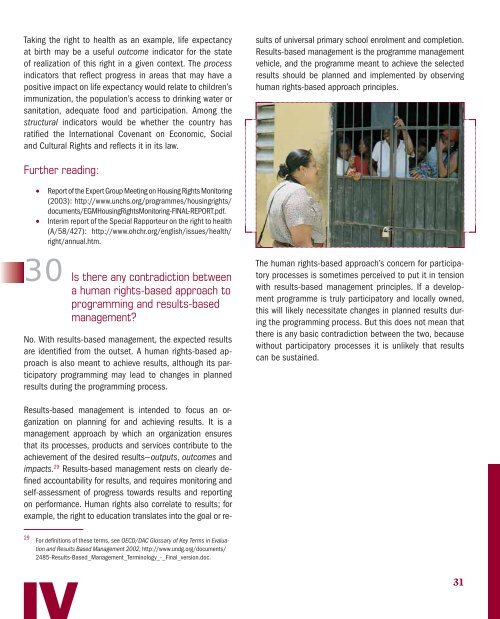Frequently Asked Questions on Human Rights-Based Approach
Frequently Asked Questions on Human Rights-Based Approach
Frequently Asked Questions on Human Rights-Based Approach
- No tags were found...
You also want an ePaper? Increase the reach of your titles
YUMPU automatically turns print PDFs into web optimized ePapers that Google loves.
Taking the right to health as an example, life expectancyat birth may be a useful outcome indicator for the stateof realizati<strong>on</strong> of this right in a given c<strong>on</strong>text. The processindicators that reflect progress in areas that may have apositive impact <strong>on</strong> life expectancy would relate to children’simmunizati<strong>on</strong>, the populati<strong>on</strong>’s access to drinking water orsanitati<strong>on</strong>, adequate food and participati<strong>on</strong>. Am<strong>on</strong>g thestructural indicators would be whether the country hasratified the Internati<strong>on</strong>al Covenant <strong>on</strong> Ec<strong>on</strong>omic, Socialand Cultural <strong>Rights</strong> and reflects it in its law.sults of universal primary school enrolment and completi<strong>on</strong>.Results-based management is the programme managementvehicle, and the programme meant to achieve the selectedresults should be planned and implemented by observinghuman rights-based approach principles.Further reading:Report of the Expert Group Meeting <strong>on</strong> Housing <strong>Rights</strong> M<strong>on</strong>itoring(2003): http://www.unchs.org/programmes/housingrights/documents/EGMHousing<strong>Rights</strong>M<strong>on</strong>itoring-FINAL-REPORT.pdf.Interim report of the Special Rapporteur <strong>on</strong> the right to health(A/58/427): http://www.ohchr.org/english/issues/health/right/annual.htm.30 Is there any c<strong>on</strong>tradicti<strong>on</strong> betweena human rights-based approach toprogramming and results-basedmanagement?No. With results-based management, the expected resultsare identified from the outset. A human rights-based approachis also meant to achieve results, although its participatoryprogramming may lead to changes in plannedresults during the programming process.The human rights-based approach’s c<strong>on</strong>cern for participatoryprocesses is sometimes perceived to put it in tensi<strong>on</strong>with results-based management principles. If a developmentprogramme is truly participatory and locally owned,this will likely necessitate changes in planned results duringthe programming process. But this does not mean thatthere is any basic c<strong>on</strong>tradicti<strong>on</strong> between the two, becausewithout participatory processes it is unlikely that resultscan be sustained.Results-based management is intended to focus an organizati<strong>on</strong><strong>on</strong> planning for and achieving results. It is amanagement approach by which an organizati<strong>on</strong> ensuresthat its processes, products and services c<strong>on</strong>tribute to theachievement of the desired results—outputs, outcomes andimpacts. 29 Results-based management rests <strong>on</strong> clearly definedaccountability for results, and requires m<strong>on</strong>itoring andself-assessment of progress towards results and reporting<strong>on</strong> performance. <strong>Human</strong> rights also correlate to results; forexample, the right to educati<strong>on</strong> translates into the goal or re-29For definiti<strong>on</strong>s of these terms, see OECD/DAC Glossary of Key Terms in Evaluati<strong>on</strong>and Results <strong>Based</strong> Management 2002, http://www.undg.org/documents/2485-Results-<strong>Based</strong>_Management_Terminology_-_Final_versi<strong>on</strong>.doc.31
















